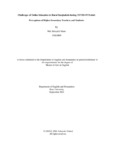| dc.contributor.advisor | Sultana, Asifa | |
| dc.contributor.author | Islam, Md. Jubaydul | |
| dc.date.accessioned | 2021-12-08T08:58:50Z | |
| dc.date.available | 2021-12-08T08:58:50Z | |
| dc.date.copyright | 2021 | |
| dc.date.issued | 2021-09 | |
| dc.identifier.other | ID 19263009 | |
| dc.identifier.uri | http://hdl.handle.net/10361/15716 | |
| dc.description | This thesis report is submitted in partial fulfilment of the requirements for the degree of Masters of Arts in Teaching to Speakers of Other Languages, 2021. | en_US |
| dc.description | Cataloged from PDF version of thesis. | |
| dc.description | Includes bibliographical references (pages 47-52). | |
| dc.description.abstract | Because of the existing COVID-19 pandemic, teaching-learning pedagogy of Bangladesh has seen a drastic change. As far as education is concerned, it has been shifted from physical classrooms to virtual platforms like Facebook, zoom, google meet etc. To ensure expected pedagogical outcome, it is significant to bring adequate changes in teaching-learning methods as per the demand of the new context (Ko & Rossen, 2010). However, some studies report that it becomes challenging for the teachers and for the students to adapt to the new context and to implement and practice the required changes in online education (Kebritchi, et al., 2016). Hence, this qualitative study aims to explore the precise voices of the teachers and the students of rural colleges of Bangladesh regarding the challenges they face in availing online education. The study explores that teachers face challenges in using technology as per the pedagogical need, in designing appropriate content and materials for online class. Also, teachers struggle to build up efficient classroom-communication with the students and to ensure quality assessment method. Moreover, students struggle to participate in online class because of not having required digital devices and better internet service. They face difficulty to understand online lecture, to adapt to the new environment, to have communication with teachers, and to take online exams. Also, some of the expectations and suggestions of the stakeholders regarding making online pedagogy efficient have been documented through this study. The researcher believes, this study has efficiently documented the predominant challenges and needs of online teaching-learning in rural Bangladesh and this documentation will help the policy makers to take precise context based measurement to make teaching-learning most efficient. | en_US |
| dc.description.statementofresponsibility | Md. Jubaydul Islam | |
| dc.format.extent | 54 pages | |
| dc.language.iso | en | en_US |
| dc.publisher | Brac University | en_US |
| dc.rights | Brac University theses are protected by copyright. They may be viewed from this source for any purpose, but reproduction or distribution in any format is prohibited without written permission. | |
| dc.subject | Online pedagogy | en_US |
| dc.subject | Challenges | en_US |
| dc.subject | Digital divide | en_US |
| dc.subject | Materials design | en_US |
| dc.subject | Technological pedagogical content knowledge | en_US |
| dc.subject | communication barrier | en_US |
| dc.subject | Assessment methods | en_US |
| dc.subject.lcsh | Distance education--Social aspects | |
| dc.subject.lcsh | Internet in education | |
| dc.title | Challenges of online education in rural Bangladesh during COVID-19 period: perceptions of higher secondary teachers and students | en_US |
| dc.type | Thesis | en_US |
| dc.contributor.department | Department of English and Humanities, Brac University | |
| dc.description.degree | M. in English | |

